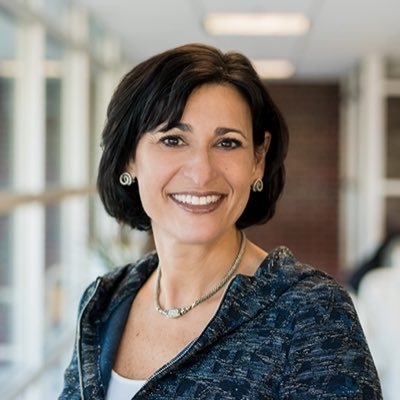You have /5 articles left.
Sign up for a free account or log in.

Dr. Rochelle Walensky
Wikimedia Commons
President-elect Joe Biden’s choice to lead the Centers for Disease Control and Prevention is an advocate for frequent, mass COVID-19 testing of college students.
Dr. Rochelle Walensky, chief of infectious diseases at Massachusetts General Hospital in Boston and professor of medicine at Harvard Medical School, is co-author of an influential modeling study arguing for the need for colleges to test students every two days in order to prevent outbreaks. The article, published in July in JAMA Network Open, proposed a testing strategy that far exceeded that recommended by the CDC, which has not to date recommended mass testing of students.
In an October interview with Inside Higher Ed, Walensky, who has two children in college, described the CDC guidance available to colleges over the summer as "really subpar. It basically had no guidance on screening and quarantining students when they arrived."
The position of CDC director does not require Senate confirmation, promising a fast start for Walensky even if Republicans retain control of the Senate.
Terry Hartle, senior vice president for government relations for the American Council on Education, said Walensky would be "the right person at the right time to restore the authority of the CDC," which has suffered a hit to its reputation during the Trump administration.
"In terms of higher education, one of the challenges that CDC will face is whether they want to begin issuing detailed guidance nine months into a pandemic," Hartle said. "The time for that may well have passed, particularly with a vaccine in the offing."
Hartle said colleges want to do more frequent testing, but it's an expensive proposition.
"We are very hopeful that Congress before they adjourn will provide some money to help colleges and universities address the extraordinary expenses they’ve encountered with the pandemic, and it now appears this will be a more limited piece of legislation and that further proposals for stimulus and pandemic relief might be coming in the Biden administration," he said. "We would certainly hope that any proposal CDC might make would be accompanied by a recognition that the financial costs of doing that can be considerable.”
Colleges' testing strategies for the fall semester have varied widely. Data from the College Crisis Initiative, a research institute based at Davidson College in North Carolina that has studied colleges’ responses to COVID, show that just 128 of the nation's four-year colleges are testing students weekly, and very few are testing more than once a week.
"Dr. Walensky’s work (which mathematically simulated an on-campus experience and testing regimes) was 100 percent correct -- institutions that implemented rigorous testing regimes and strong behavioral interventions weathered the COVID-19 crisis with very few cases on campus," said Christopher R. Marsicano, founding director of the research institute and assistant professor of the practice of higher education at Davidson. "Unfortunately, the cost of implementing her recommendation -- testing students every two days -- was cost prohibitive for almost all institutions across the country. Higher education leaders saw that study and said, 'That’s great, but how the heck are we going to be able to pay for that? There’s got to be another way.'"
Marsicano said colleges and universities will be forced to continue testing at "suboptimal rates" until testing costs are cut in half or state legislatures and the federal government provide enough funding "to keep testing at the forefront of college and university responses."
He's hoping Walensky will help focus attention on the need for more government funding for testing.
"The choice [of Walensky] is probably a great one for higher education in the middle of the pandemic," he said. "It is a lot easier for colleges and universities to lobby for financial support for testing when they know the CDC director’s research backs up their claims."
Many public health and infectious disease experts cheered the selection of Walensky, who is an authority on HIV and AIDS. She is a past chair of the Office of AIDS Research Advisory Council at the National Institutes of Health and chair-elect of the HIV Medical Association.
A. David Paltiel, a professor of public health at Yale University and a longtime collaborator with Walensky -- they have authored more than 80 papers together, including the JAMA Network Open paper on frequent COVID testing on college campuses -- is "over the moon" about Walensky's appointment.
"She’s an absolutely state-of-the-art brilliant scientist; she is a compassionate physician," Paltiel said. "I can tell you that because she and I have worked on HIV-related matters for many years. I’m a mathematician. I sit in a box and build mathematical models. These things are abstract for me, so I thought it was very important early on in our collaborations for me to spend some time rounding with her. I spent a couple of days watching her deliver care to some very difficult individuals, and the compassion and respect and humanity with which she dealt with them -- I’ve never forgotten it."
As for the implications for higher education, Paltiel pointed out that Walensky's portfolio at the CDC will be broad.
"It's hard to know where that fits in the priority ranking, but you have to imagine that some science-based approach to keeping campuses safe will emerge," Paltiel said. He said the current CDC guidelines "don't take sides between essentially doing nothing and rapid testing and every possibility in between," and expects that Walensky will have no difficulty differentiating between better and worse options.
The CDC's most recent guidance on testing for colleges, updated in October, says that "a strategy of entry screening combined with regular serial testing might prevent or reduce transmission," but it stops short of recommending this strategy. The agency lays out a menu of options ranging from no testing to repeated testing and includes a footnote stipulating that "there is currently limited scientific evidence to guide decisions to use or not use one of these strategies."
Carlos del Rio, an executive dean and distinguished professor of medicine, epidemiology and global health at Emory University in Atlanta, also praised the pick.
"I’ve known Rochelle for a long time, and she is an incredibly thoughtful individual who is always guiding her decisions based on data, who has done some very innovative research," he said. "Her research is very focused on looking at cost-effectiveness and looking at access and looking at ways to improve access and decision making."
Del Rio also praised Walensky's scientific credibility and communications skills.
"I think she has a lot of the things that are sorely needed right now in a CDC that has quite frankly been significantly battered by this administration," he said.
In addition to her work on COVID testing at colleges, Walensky has also been part of national discussions about COVID and campus life. She was one of more than 100 public health experts who signed an open letter to university leaders calling on them to adopt a humane approach to students during the pandemic and arguing against an "abstinence-only approach to social contact."
In her October interview with Inside Higher Ed, Walensky, who also has a child in high school in addition to the two in college, said some colleges have been successful at containing the virus whether through testing, strict mitigation strategies, or maintaining a tight campus "bubble." But she lamented the loss of the college experience.
"I think there have been numerous universities that have demonstrated that what they’re doing is safe, it may be enough to get students back, but many university presidents are saying [their students] are not having fun. They're here, they’re learning, but they’re not getting the college experience that we wanted them to, and I don’t think the professors are happy. Many are worried that they are at high risk, and many are worried that they’re not actually doing their jobs."
On a personal level, she's worried, too.
"My kids will lose at least half of their college career, if not more," she said. "It will not be what it was, it will not be what it’s supposed to be. Regardless of how this goes for the next year, that will be true."








